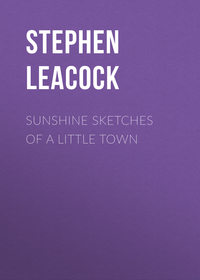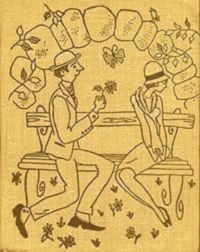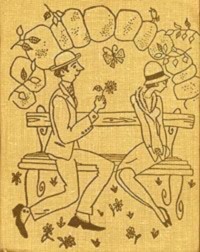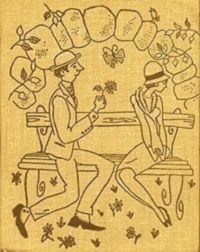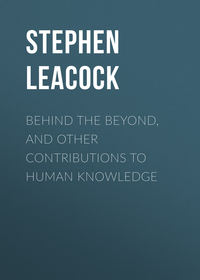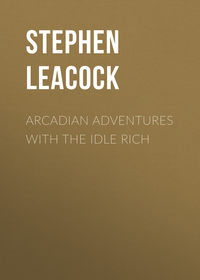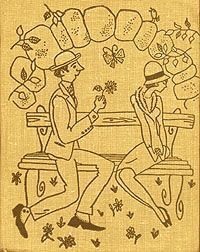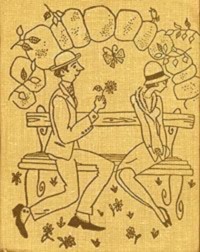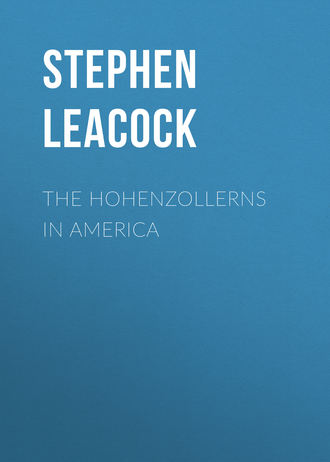 полная версия
полная версияThe Hohenzollerns in America
Now what comes next?
"…The young Christopher developed at an early age a passion for study, and especially for astronomy, geometry, geodesy, and the exact science of the day."
Quite easy. On spins the film. Young Christopher in a garret room (all movie study is done in garrets). The cardboard ceiling slopes within six inches of his head. This shows that the boy never rises from his books. He can't. On a table in front of him is a little globe and a pair of compasses. Christopher spins the globe round. Then he makes two circles with the compasses, one after the other, very carefully. This is the recognised movie symbol for mathematical research.
So there we have Christopher—poor, honest, studious, full of circles.
Now to the book again.
"…The young Columbus received his education at the monastery of the Franciscan monks at Genoa. Here he spent seven years."
Yes, but we can put that on the screen in seven seconds.
Turn on the film.
Movie Monastery—exterior, done in grey cardboard—ding, dong, ding, dong (man in the orchestra with triangle and stick)—procession of movie friars—faces more like thugs, but never mind—they are friars because they walk two and two in a procession, singing out of hymn books.
Now for the book again.
"…Fra Giacomo, the prior of the monastery, delighted with the boy's progress, encourages his studies."
Wait a minute.
FRA GIACOMO… Mr. Edward Sims
Mr. Sims's face, clean-shaved under a round hat fades in and out. Then the picture goes on. Movie monastery interior—young Christopher, still at a table with compasses—benevolent friar bending over him—Christopher turns the compasses and looks up with a what-do-you-know-about-that look—astonishment and delight of friar (registered by opening his eyes like a bull frog). All this shows study, progress, application. The friars are delighted with the boy.
"…Christopher, after seven years of study, reaches the firm conviction that the world is round."
Picture. Christopher—with his globe—jumps up from table—passes his fingers round and round the globe—registers the joy of invention—seats himself at table and draws circles with his compasses furiously. He fades out.
"…Fired with his discovery Christopher sets out from the monastery."
Stop a minute, this is a little hard. Fired. How can we show Christopher "fired." We can't. Perhaps he'll be fired if the film is no good, but we must omit it just now.
"He sets out."
One second only for this. Monastery door (double cardboard with iron across it)—Christopher leaving—carries a wallet to mean distance. Fra Giacomo blessing him—fade out.
"…For eighteen years Columbus vainly travelled through the world on foot offering his discovery at the courts of Europe, in vain, though asking nothing in return for it except a fleet of ships, two hundred men and provisions for two years."
To anybody not used to scenarios this looks a large order. Eighteen years seems difficult to put on the screen. In reality this is exactly where the trained movie man sees his chance. Here he can put in anything and everything that he likes, bringing in, in a slightly mediaeval form, all his favourite movie scenes.
Thus, for example, here we have first the good old midnight cabaret supper scene—thinly disguised as the court of the King of Sardinia. To turn a cabaret into a court the movie men merely exchange their Fifth Avenue evening dress for short coats and knee breeches, heavily wadded and quilted, and wear large wigs. Quilted pants and wigs register courtiers, the courtiers of anybody—Charlemagne, Queen Elizabeth, Peter the Great, Louis Quatorze, anybody and everybody who ever had courtiers. Just as men with bare legs mean Romans, men in pea-jackets mean detectives, and young men drunk in evening dress Harvard graduates.
The ladies at the court of Sardinia wear huge paper frills round their necks. Otherwise it is the cabaret scene with the familiar little tables, and the ukaleles going like mad in one corner, and black sarsaparilla being poured foaming into the glasses.
In this scene Columbus moves up and down, twirling his little globe and looking appealingly in their faces. All laugh at him. His part is just the same as that of the poor little girl trying to sell up-state violets in the midnight cabaret.
The Court of Sardinia fades and the film shows Columbus vainly soliciting financial aid from Lorenzo the Magnificent.
Stop one minute, please.
LORENZO THE MAGNIFICENT… Mr. L. Evans
This scene again is old and familiar. It is the well-known interior representing the Grinding Capitalist, or the Bitter Banker refusing aid to the boy genius who has invented a patent pea-rake. The only change is that Lorenzo wears a huge wig, has no telephone, and handles a large quill pen (to register Middle Ages) which he wiggles furiously up and down on a piece of parchment.
So the eighteen years, with scenes of this sort turn out the easiest part of the whole show.
But let us to the book again.
"…After eighteen years Columbus, now past the prime of life, is presented at the Court of Queen Isabella of Spain."
Just half a moment.
QUEEN ISABELLA.. Miss Janet Briggs
There will be very probably at this point a slight applause from the back of the hall. Miss Briggs was here last week, or her astral body was—as Maggie of the Cattle Ranges. The impression that she made is passed on to Isabella.
"The Queen and her consort, King Ferdinand of Aragon…"
Stop, stick him on the film.
FERDINAND OF ARAGON.. Mr. Edward Giles
(Large wig, flat velvet cap and square whiskers—same make-up as for Ferdinand of Bulgaria, Ferdinand of Bohemia, or any of the Ferdinands.)
"…were immediately seized with enthusiasm for the marvellous discovery of the Genoese adventurer."
Picture. Columbus hands his globe to Isabella and his compasses to Ferdinand. They register delight and astonishment. The Queen turns the globe round and round and holds it up to Ferdinand. Both indicate with their faces, well-what-do-you-know-about-this. Ferdinand makes a circle with the compasses on a table—the courtiers, fickle creatures, crowd around. They are still dressed as in Sardinia eighteen years ago. In fact, one recognises quite a lot of them. When Ferdinand draws the circle they fall back in wild astonishment, gesticulating frantically. What they mean is, "It's a circle, it's a circle."
"The King and Queen at once place three ships at the disposal of Columbus."
On with the picture. The harbour of the port of Palos— ships bobbing up and down (it is really the oyster boats in Baltimore Bay but it looks just like Palos, or near enough). Notice Queen Isabella on the right, at the top of a flight of steps, extending her hand and looking at Columbus. Her gesture means, "Pick a ship, any ship you like, any colour." Just as if she were saying, "Pick a card, any card you like."
We turn again to the history.
"…Christopher Columbus, now arrived at the height of his desire, sets out upon his memorable voyage accompanied by a hundred companions in three caravels, the Pinta, the Nina and the Espiritu Santo."
Ah, here we have the movie work—the real thing. Cardboard caravel tossing on black water—seen first right close to us—we are almost on board of it. Notice the movie sailors with black whiskers and bare feet (bare feet in the movies always means a sailor, and black whiskers mean Spaniards). Now we see the caravel a little way out—whoop! How she bobs up and down! They give her that jolt (it's done with the machine itself) to mean danger. There are all three caravels—Hoop—er—oo! See them go up and down—stormy night coming all right. See the sun setting in the west, over the water? They're heading straight for it. Good-night Columbus—take care of yourself out there in the blackness.
"During the voyage Columbus remained continually on deck. Sleeping at the prow, his face towards the new world, he saw already in his dreams the accomplishment of his hopes."
On goes the picture. Christopher in the prow of the caravel (in the movies a prow is made by putting two little board fences together and propping up a bowsprit lengthwise over them). Columbus sits up, peers intently into the darkness, his hand to his brow—registers a look. Do I see America? No. Lies down, shuts his eyes and falls into an instantaneous movie sleep. His face fades out slowly to music, which means that he is going to dream. Then on the screen the announcement is shown:
SPIRIT OF AMERICA… Miss E. Dickenson
and here we have Miss Dickenson floating in the air above Columbus. She wears nothing except mosquito netting, but she has got on enough of it to get past the censor of the State of New York. Just enough, apparently.
Miss E. Dickenson is joined by a whole troop of Miss Dickensons all in white mosquito netting. They go through a series of beautiful evolutions, floating over the sleeping figure of Columbus. The dance they do is meant to typify, or rather to signify,—as a matter of fact we needn't worry much about what it signified. It is an allegory, done in white mosquito netting. That is generally held to be quite enough. Let us go back to the book—
"After a storm-tossed voyage of three months…"
Wait a bit. Turn on the picture again and toss the caravels up and down.
"…during which the food supply threatened to fail…"
Put that on the screen, please. Columbus surrounded by ten sailors, dividing up a potato.
"…the caravels arrived in safety at the beautiful island of San Salvador. Columbus, bearing the banner of Spain, stepped first ashore. Surrounded by a wondering crowd of savages he prostrated himself upon the beach and kissed the soil of the New World that he had discovered."
All this is so easy that it's too easy. It runs into pictures of itself. Anybody, accustomed to the movies, can see Columbus with his banner and the movie savages hopping up and down around him. Movie savages are gay, gladsome creatures anyway, and hopping up and down is their chief mode of expressing themselves. Add to them a sandy beach, with palm trees waving visibly in the wind (it is always windy in the movies) and the thing is done.
Just one further picture is needed to complete the film.
"Columbus who returned to Europe to lay at the feet of the Spanish sovereigns the world he had discovered, fell presently under the disfavour of the court, and died in poverty and obscurity, a victim of the ingratitude of princes."
Last picture. Columbus dying under the poignant circumstances known only in the movies—a garret room—ceiling lower than ever—a truckle bed, narrow enough to kill him if all else failed—Teresa Colombo his aged mother alone at his bedside—she offers him medicine in a long spoon—(this shows, if nothing else would, that the man is ill)—he shakes his head—puts out his hand and rests it on the little globe—reaches feebly for his compasses—can't manage it—rolls up his eyes and fades.
The music plays softly and the inexorable film, like the reel of life itself, spins on, announcing
At this theatre
All next week
MAGGIE MAY
and
WALTER CURRAN
in
IS IT WORTH IT
And after that I can imagine the audience dispersing, and the now educated children going off to their homes and one saying as he enters—
"Gee, I seen a great picture show at school to-day."
"Yes?" says his mother, "and what was it?"
"Oh, it was all about a gink that went round the cabarets trying to sell an invention what he'd got but nobody wouldn't look at it till at last one dame gave him three oyster boats, see? and so he and a lot of other guys loaded them up and hiked off across the ocean."
"And where did he go to?"
"Africa. And he and the other guys had a great stand in with the natives and he'd have sold his invention all right but one old dame got him alone in a hut and poisoned him and took it off him."
That, I think, is about the way the film would run. When it is finished I must get President Shurman, or whoever it was, to come and see it.
4.—Politics from Within
To avoid all error as to the point of view, let me say in commencing that I am a Liberal Conservative, or, if you will, a Conservative Liberal with a strong dash of sympathy with the Socialist idea, a friend of Labour, and a believer in Progressive Radicalism. I do not desire office but would take a seat in the Canadian Senate at five minutes notice.
I believe there are ever so many people of exactly this way of thinking.
Let me say further than in writing of "politics" I am only dealing with the lights and shadows that flicker over the surface, and am not trying to discuss, still less to decry, the deep and vital issues that lie below.
Yet I will say that vital though the issues may be below the surface, there is more clap-trap, insincerity and humbug on the surface of politics than over any equal area on the face of any institution.
The candidate, as such, is a humbug. The voters, as voters—not as fathers, brothers or sons—are humbugs. The committees are humbugs. And the speeches to the extent of about ninety per cent are pure buncombe. But, oddly enough, out of the silly babel of talk that accompanies popular government, we get, after all, pretty good government—infinitely better than the government of an autocratic king. Between democracy and despotic kingship lies all the difference between genial humbug and black sin.
For the candidate for popular office I have nothing but sympathy and sorrow. It has been my fortune to walk round at the heels of half a dozen of them in different little Canadian towns, watching the candidate try in vain to brighten up his face at the glad sight of a party voter.
One, in particular, I remember. Nature had meant him to be a sour man, a hard man, a man with but little joy in the company of his fellows. Fate had made him a candidate for the House of Commons. So he was doing his best to belie his nature.
"Hullo, William!" he would call out as a man passed driving a horse and buggy, "got the little sorrel out for a spin, eh?"
Then he would turn to me and say in a low rasping voice—
"There goes about the biggest skunk in this whole constituency."
A few minutes later he would wave his hand over a little hedge in friendly salutation to a man working in a garden.
"Hullo, Jasper! That's a fine lot of corn you've got there."
Jasper replied in a growl. And when we were well past the house the candidate would say between his teeth—
"That's about the meanest whelp in the riding."
Our conversation all down the street was of that pattern.
"Good morning, Edward! Giving the potatoes a dose of
Paris green, eh?"
And in an undertone—
"I wish to Heaven he'd take a dose of it himself."
And so on from house to house.
I counted up, from one end of the street to the other, that there were living in it seven skunks, fourteen low whelps, eight mean hounds and two dirty skinflints. And all of these merely among the Conservative voters. It made me wish to be a Liberal. Especially as the Liberal voters, by the law of the perversity of human affairs, always seemed to be the finer lot. As they were NOT voting for our candidate, they were able to meet him in a fair and friendly way, whereas William and Jasper and Edward and our "bunch" were always surly and hardly deigned to give more than a growl in answer to the candidate's greeting, without even looking up at him.
But a Liberal voter would stop him in the street and shake hands and say in a frank, cordial way.
"Mr. Grouch, I'm sorry indeed that I can't vote for you, and I'd like to be able to wish you success, but of course you know I'm on the other side and always have been and can't change now."
Whereupon the Candidate would say. "That's all right, John, I don't expect you to. I can respect a man's convictions all right, I guess."
So they would part excellent friends, the Candidate saying as we moved off:
"That man, John Winter, is one of the straightest men in this whole county."
Then he would add—
"Now we'll just go into this house for a minute. There's a dirty pup in here that's one of our supporters."
My opinion of our own supporters went lower every day, and my opinion of the Liberal voters higher, till it so happened that I went one day to an old friend of mine who was working on the Liberal side. I asked him how he liked it.
"Oh, well enough!" he said, "as a sort of game. But in this constituency you've got all the decent voters; our voters are the lowest bunch of skunks I ever struck."
Just then a man passed in a buggy, and looked sourly at my friend the Liberal worker.
"Hullo, John!" he called, with a manufactured hilarity, "got the little mare out for a turn, eh?"
John grunted.
"There's one of them," said my friend, "the lowest pup in this county, John Winter."
"Come along," said the Candidate to me one morning, "I want you to meet my committee."
"You'll find them," he said confidingly, as we started down the street towards the committee rooms, "an awful bunch of mutts."
"Too bad," I said, "what's wrong with them?"
"Oh, I don't know—they're just a pack of simps. They don't seem to have any PUNCH in them. The one you'll meet first is the chairman—he's about the worst dub of the lot; I never saw a man with so little force in my life. He's got no magnetism, that's what's wrong with him—no magnetism."
A few minutes later the Candidate was introducing me to a roomful of heavy looking Committee men. Committee men in politics, I notice, have always a heavy bovine look. They are generally in a sort of daze, or doped from smoking free cigars.
"Now I want to introduce you first," said the Candidate, "to our chairman, Mr. Frog. Mr. Frog is our old battle horse in this constituency. And this is our campaign secretary Mr. Bughouse, and Mr. Dope, and Mr. Mudd, et cetera."
Those may not have been their names.
It is merely what the names sounded like when one was looking into their faces.
The Candidate introduced them all as battle horses, battle axes, battle leaders, standard bearers, flag-holders, and so forth. If he had introduced them as hat-racks or cigar holders, it would have been nearer the mark.
Presently the Candidate went out and I was left with the battle-axes.
"What do you think of our chances?" I asked.
The battle-axes shook their heads with dubious looks.
"Pretty raw deal," said the Chairman, "the Convention wishing HIM on us." He pointed with his thumb over his shoulder to indicate the departed Candidate.
"What's wrong with him?" I asked.
Mr. Frog shook his head again.
"No PUNCH," he said.
"None at all," agreed all the battle horses.
"I'll tell you," said the Campaign secretary, Mr. Bughouse, a voluble man, with wandering eyes—"the trouble is he has no magnetism, no personal magnetism."
"I see," I said.
"Now, you take this man, Shortis, that the Liberals have got hold of," continued Mr. Bughouse, "he's full of MAGNETISM. He appeals."
All the other Committee men nodded.
"That's so," they murmured, "magnetism, Our man hasn't a darned ounce of it."
"I met Shortis the other night in the street," went on Mr. Bughouse, "and he said, 'Come on up to my room in the hotel.' 'Oh,' I said, 'I can't very well.' 'Nonsense,' he said, 'You're on the other side but what does that matter?' Well, we went up to his room, and there he had whiskey, and gin, and lager,—everything. 'Now,' he says, 'name your drink—what is it?' There he was, right in his room, breaking the law without caring a darn about it. Well, you know the voters like that kind of thing. It appeals to them."
"Well," said another of the Committee men,—I think it was the one called Mr. Dope, "I wouldn't mind that so much. But the chief trouble about our man, to my mind, is that he can't speak."
"He can't?" I exclaimed.
All the Committee shook their heads.
"Not for sour apples!" asserted Mr. Dope positively. "Now, in this riding that won't do. Our people here are used to first class speaking, they expect it. I suppose there has been better speaking in this Constituency than anywhere else in the whole dominion. Not lately, perhaps; not in the last few elections. But I can remember, and so can some of the boys here, the election when Sir John A. spoke here, when the old Mackenzie government went out."
He looked around at the circle. Several nodded.
"Remember it as well," assented Mr. Mudd, "as if it were yesterday."
"Well, sir," continued Mr. Dope, "I'll never forget Sir
John A. speaking here in the Odd Fellows' Hall, eh?"
The Committee men nodded and gurgled in corroboration.
"My! but he was PLASTERED. We had him over at Pete Robinson's hotel all afternoon, and I tell you he was plastered for fair. We ALL were. I remember I was so pickled myself I could hardly help Sir John up the steps of the platform. So were you, Mudd, do you remember?"
"I certainly was!" said Mr. Mudd proudly. Committee men who would scorn to drink lager beer in 1919, take a great pride, I have observed, in having been pickled in 1878.
"Yes, sir," continued Mr. Dope, "you certainly were pickled. I remember just as well as anything, when they opened the doors and let the crowd in: all the boys had been bowling up and were pretty well soused. You never saw such a crowd. Old Dr. Greenway (boys, you remember the old Doc) was in the chair, and he was pretty well spifflocated. Well, sir, Sir John A. got up in that hall and he made the finest, most moving speech I ever listened to. Do you remember when he called old Trelawney an ash-barrel? And when he made that appeal for a union of hearts and said that the sight of McGuire (the Liberal candidate) made him sick? I tell you those were great days. You don't get speaking like that now; and you don't get audiences like that now either. Not the same calibre."
All the Committee shook their heads.
"Well, anyway, boys," said the Chairman, as he lighted a fresh cigar, "to-morrow will decide, one way or the other. We've certainly worked hard enough,"—here he passed the box of cigars round to the others—"I haven't been in bed before two any night since the work started."
"Neither have I," said another of the workers. "I was just saying to the wife when I got up this morning that I begin to feel as if I never wanted to see the sight of a card again."
"Well, I don't regret the work," said the Secretary, "so long as we carry the riding. You see," he added in explanation to me, "we're up against a pretty hard proposition here. This riding really is Liberal: they've got the majority of voters though we HAVE once or twice swung it Conservative. But whether we can carry it with a man like Grouch is hard to say. One thing is certain, boys, if he DOES carry it, he doesn't owe it to himself."
All the battle horses agreed on this. A little after that we dispersed.
And twenty-four hours later the vote was taken and to my intense surprise the riding was carried by Grouch the Conservative candidate.
I say, to MY surprise. But apparently not to anybody else.
For it appeared this (was in conversations after the election) that Grouch was a man of extraordinary magnetism. He had, so they said, "punch." Shortis, the Liberal, it seemed, lacked punch absolutely. Even his own supporters admitted that he had no personality whatever. Some wondered how he had the nerve to run.
But my own theory of how the election was carried is quite different.
I feel certain that all the Conservative voters despised their candidate so much that they voted Liberal. And all the Liberals voted Conservative.
That carried the riding.
Meantime Grouch left the constituency by the first train next day for Ottawa. Except for paying taxes on his house, he will not be back in the town till they dissolve parliament again.
5.—The Lost Illusions of Mr. Sims
In the club to which I belong, in a quiet corner where the sunlight falls in sideways, there may be seen sitting of an afternoon my good friend of thirty years' standing, Mr. Edward Sims. Being somewhat afflicted with gout, he generally sits with one foot up on a chair. On a brass table beside him are such things as Mr. Sims needs. But they are few. Wealthy as he is, the needs of Mr. Sims reach scarcely further than Martini cocktails and Egyptian cigarettes. Such poor comforts as these, brought by a deferential waiter, with, let us say, a folded newspaper at five o'clock, suffice for all his wants. Here sits Mr. Sims till the shadows fall in the street outside, when a limousine motor trundles up to the club and rolls him home.


